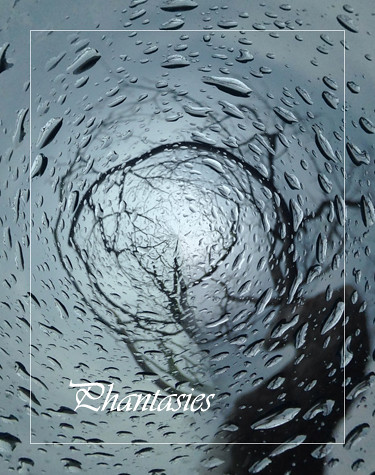
Volume XII, Issue XXI
Phantasies
By George MacDonald, Chapter 15
Alexander: "When will you finish Campaspe?"
Apelles: "Never finish: for always in absolute
beauty there is somewhat above art."
~ from John Lyly's play, "Campaspe".
And now, what song should I sing to unveil my Isis, if indeed she was present unseen? I hurried away to the white hall of Phantasy, heedless of the innumerable forms of beauty that crowded my way: these might cross my eyes, but the unseen filled my brain. I wandered long, up and down the silent space: no songs came. My soul was not still enough for songs. Only in the silence and darkness of the soul's night, do those stars of the inward firmament sink to its lower surface from the singing realms beyond, and shine upon the conscious spirit. Here all effort was unavailing. If they came not, they could not be found.
Next night, it was just the same. I walked through the red glimmer of the silent hall; but lonely as there I walked, as lonely trod my soul up and down the halls of the brain. At last I entered one of the statue-halls. The dance had just commenced, and I was delighted to find that I was free of their assembly. I walked on till I came to the sacred corner. There I found the pedestal just as I had left it, with the faint glimmer as of white feet still resting on the dead black. As soon as I saw it, I seemed to feel a presence which longed to become visible; and, as it were, called to me to gift it with self-manifestation, that it might shine on me. The power of song came to me. But the moment my voice, though I sang low and soft, stirred the air of the hall, the dancers started; the quick interweaving crowd shook, lost its form, divided; each figure sprang to its pedestal, and stood, a self-evolving life no more, but a rigid, life-like, marble shape, with the whole form composed into the expression of a single state or act. Silence rolled like a spiritual thunder through the grand space. My song had ceased, scared at its own influences. But I saw in the hand of one of the statues close by me, a harp whose chords yet quivered. I remembered that as she bounded past me, her harp had brushed against my arm; so the spell of the marble had not infolded it. I sprang to her, and with a gesture of entreaty, laid my hand on the harp. The marble hand, probably from its contact with the uncharmed harp, had strength enough to relax its hold, and yield the harp to me. No other motion indicated life. Instinctively I struck the chords and sang. And not to break upon the record of my song, I mention here, that as I sang the first four lines, the loveliest feet became clear upon the black pedestal; and ever as I sang, it was as if a veil were being lifted up from before the form, but an invisible veil, so that the statue appeared to grow before me, not so much by evolution, as by infinitesimal degrees of added height. And, while I sang, I did not feel that I stood by a statue, as indeed it appeared to be, but that a real woman-soul was revealing itself by successive stages of imbodiment, and consequent manifestation and expression.
Feet of beauty, firmly planting
Arches white on rosy heel!
Whence the life-spring, throbbing, panting,
Pulses upward to reveal!
Fairest things know least despising;
Foot and earth meet tenderly:
'Tis the woman, resting, rising
Upward to sublimity,
Rise the limbs, sedately sloping,
Strong and gentle, full and free;
Soft and slow, like certain hoping,
Drawing nigh the broad firm knee.
Up to speech! As up to roses
Pants the life from leaf to flower,
So each blending change discloses,
Nearer still, expression's power.
Lo! fair sweeps, white surges, twining
Up and outward fearlessly!
Temple columns, close combining,
Lift a holy mystery.
Heart of mine! what strange surprises
Mount aloft on such a stair!
Some great vision upward rises,
Curving, bending, floating fair.
Bands and sweeps, and hill and hollow
Lead my fascinated eye;
Some apocalypse will follow,
Some new world of deity.
Zoned unseen, and outward swelling,
With new thoughts and wonders rife,
Queenly majesty foretelling,
See the expanding house of life!
Sudden heaving, unforbidden
Sighs eternal, still the same--
Mounts of snow have summits hidden
In the mists of uttered flame.
But the spirit, dawning nearly
Finds no speech for earnest pain;
Finds a soundless sighing merely--
Builds its stairs, and mounts again.
Heart, the queen, with secret hoping,
Sendeth out her waiting pair;
Hands, blind hands, half blindly groping,
Half inclasping visions rare;
And the great arms, heartways bending;
Might of Beauty, drawing home
There returning, and re-blending,
Where from roots of love they roam.
Build thy slopes of radiance beamy
Spirit, fair with womanhood!
Tower thy precipice, white-gleamy,
Climb unto the hour of good.
Dumb space will be rent asunder,
Now the shining column stands
Ready to be crowned with wonder
By the builder's joyous hands.
All the lines abroad are spreading,
Like a fountain's falling race.
Lo, the chin, first feature, treading,
Airy foot to rest the face!
Speech is nigh; oh, see the blushing,
Sweet approach of lip and breath!
Round the mouth dim silence, hushing,
Waits to die ecstatic death.
Span across in treble curving,
Bow of promise, upper lip!
Set them free, with gracious swerving;
Let the wing-words float and dip.
Dumb art Thou? O Love immortal,
More than words thy speech must be;
Childless yet the tender portal
Of the home of melody.
Now the nostrils open fearless,
Proud in calm unconsciousness,
Sure it must be something peerless
That the great Pan would express!
Deepens, crowds some meaning tender,
In the pure, dear lady-face.
Lo, a blinding burst of splendour!--
'Tis the free soul's issuing grace.
Two calm lakes of molten glory
Circling round unfathomed deeps!
Lightning-flashes, transitory,
Cross the gulfs where darkness sleeps.
This the gate, at last, of gladness,
To the outward striving me:
In a rain of light and sadness,
Out its loves and longings flee!
With a presence I am smitten
Dumb, with a foreknown surprise;
Presence greater yet than written
Even in the glorious eyes.
Through the gulfs, with inward gazes,
I may look till I am lost;
Wandering deep in spirit-mazes,
In a sea without a coast.
Windows open to the glorious!
Time and space, oh, far beyond!
Woman, ah! thou art victorious,
And I perish, overfond.
Springs aloft the yet Unspoken
In the forehead's endless grace,
Full of silences unbroken;
Infinite, unfeatured face.
Domes above, the mount of wonder;
Height and hollow wrapt in night;
Hiding in its caverns under
Woman-nations in their might.
Passing forms, the highest Human
Faints away to the Divine
Features none, of man or woman,
Can unveil the holiest shine.
Sideways, grooved porches only
Visible to passing eye,
Stand the silent, doorless, lonely
Entrance-gates of melody.
But all sounds fly in as boldly,
Groan and song, and kiss and cry
At their galleries, lifted coldly,
Darkly, 'twixt the earth and sky.
Beauty, thou art spent, thou knowest
So, in faint, half-glad despair,
From the summit thou o'erflowest
In a fall of torrent hair;
Hiding what thou hast created
In a half-transparent shroud:
Thus, with glory soft-abated,
Shines the moon through vapoury cloud.
(to be continued)
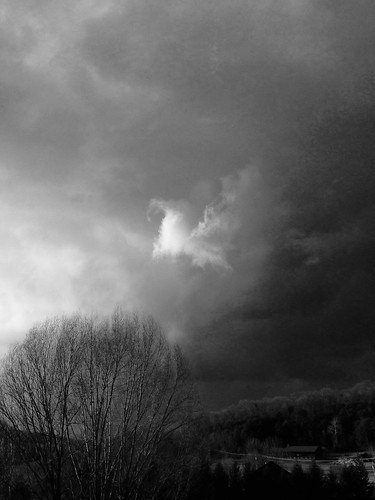
Unipege. Photo by bob Kirchman
Ripples in Ramsey's Draft
Photos by Bob Kirchman
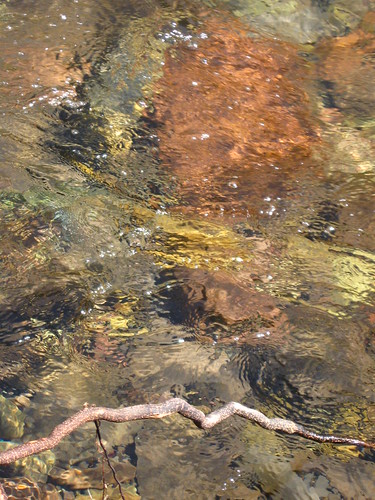
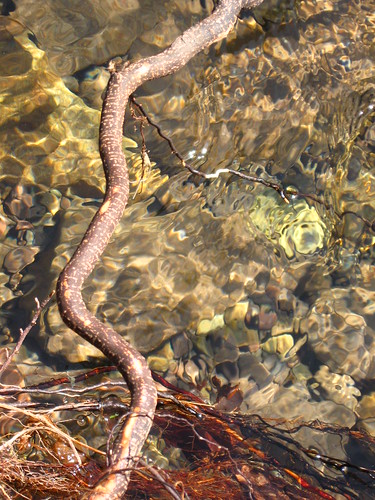
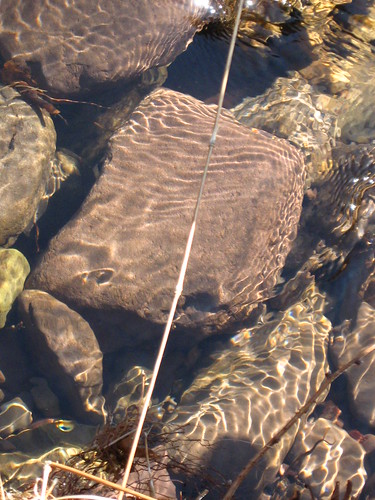
Alike, A Short Film
Daniel Martínez, Lara and Rafa Cano Méndez
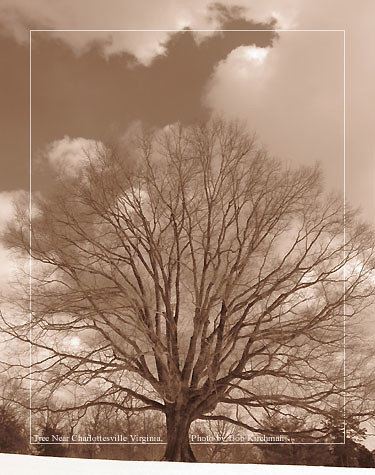
Oak Tree, Charlottesville, Virginia.
A Case for Vision III
You may nave noticed that THYME has long departed from being a simple parody of the 'other' weekly news magazine. The reason is twofold. First of all. it became a bit sophomoric to parody a magazine that asks on its cover: "Is God Dead?" Lately they've 'discovered' that the same question can be asked of truth. Journalism seems to have lost its way. That is why we love the new movie based on the investigations of Lee Strobel, The Case for Christ. Second, the times demand a more serious approach. We are confronted today by very real problems. If we can draw from history and the voice of experience, we must do so. The political class and the media seem intent on silencing certain voices in the debate. It is those very voices, may I suggest, that we need most to listen to. The country today seems intent on allowing itself to crumble. Noble virtues are denigrated while the vague goal of 'self actualization' has become the subject of ardent pursuit. Relativism is the rule and 'tolerance' the supreme virtue. Clearly we are a nation in distress. Looking back into history, can we find evidence that we as a people have faced similar peril? If so, what lessons might we learn to help us in the struggle for America today? Consider the condition of the nation in the turbulent time following the Revolution.
As the Eighteenth Century drew to a close there were almost a million new settlers to the West of the Blue Ridge Mountains. In 1803, France sold the Louisiana Purchase to the young nation and Thomas Jefferson, essentially doubling the size of the United States. Lewis and Clark's reports of this vast land would only serve to further fuel the drive for Westward expansion. While the future looked bright for the country, the future of the Christian Faith seemed to be one of slowly diminishing light. Church attendance was dropping off. New ideas from Europe challenged the narrative of Faith and it looked like the influence of Faith would fade, even as the New World filled itself. An Episcopal preacher in the Carolinas said: "How many thousands . . . never saw, much less read, or ever heard a Chapter of the Bible! How many Ten thousands who never were baptized or heard a Sermon! And thrice Ten thousand, who never heard of the Name of Christ, save in Curses . . . ! Lamentable! Lamentable is the situation of these people." Though the land was rich in promise, the spiritual condition of her people was quite impoverished. Immorality and vice abounded as settlement continued. Though no national media paraded it, the dark side of human nature reigned in many remote places. In the wilds of Kentucky, in what would become Logan County, there was a place called Rogues' Harbor. The Digital History of North Carolina describes it as follows: "Here many refugees from almost all parts of the Union fled to escape justice or punishment. . . . It was a desperate state of society. Murderers, horse-thieves, highway robbers, and counterfeiters fled there, until they combined and actually formed a majority." -North Carolina Digital History
But something happened in the very fabric of our nation about that time that would shape our future and chart our course well into the Centuries to follow. There was still much immorality and vice to be found, but in 1799 a Prebyterian minister wrote: "We have heard from different parts the glad tidings of the outpourings of the Spirit, and of times of refreshing from the presence of the Lord. . . . From the East, from the West, and from the South, have these joyful tidings reached our ears." The Second Great Awakening came to life as men like James McGready brought the message of Hope and Redemption to the frontier. McGready did not fear to enter places like Rogues' Harbor to speak of: "Heaven and its glories, Hell and its torments." In 1796, McGready was Pastoring three churches in Southwestern Kentucky. In what can only be attributed to a mighty move of the Spirit of G-d, hundreds of people at a time were finding a new and refreshed Faith across the frontier in camp meetings and revivals. In the South and the West. Barton W. Stone was the Presbyterian Pastor of the Cane Ridge and Concord churches, northeast of Lexington, Kentucky. Stone observed McGready's work in Logan County and laid plans for a similar meeting for August 1801 at Cane Ridge. Over 10,000 people attended that meeting. Some estimates put the crowd as high as 25,000. The flames of revival were spreading, leaping now into Tennessee!
Stone observed that Presbyterians, Baptists and Methodists were all joined together at this great meeting, singing the same songs and experiencing the same Spirit! "The rough, violent, irreligious frontier, which many felt threatened to undo the morals of the new nation, was being tamed by the Lamb of God." In the East, a similar manifestation of the Spirit of G-d was taking place. Though many prayed for revival, the rise of Universalists, Unitarians and Deists in the region had denied the basic teachings of Christianity and dulled the impact of Faith. Jonathan Edward's Grandson Timothy Dwight observed of the period during and after the Revolution as follows: "The profanation of the Sabbath . . . profaneness of language, drunkenness, gambling, and lewdness, were exceedingly increased; and, what is less commonly remarked, but is not less mischievous, than any of them, a light, vain method of thinking, concerning sacred things, a cold, contemptuous indifference toward every moral and religious subject." But the fires of Revival were stirring in the East. Though this movement was quieter in some respects, it's deep roots would manifest themselves in cultural reform. The abolitionist movement, for example, would come out of this renewed mind. Pastor Alvan Hyde wrote: ". . . A marvelous work was begun, and it bore the most decisive marks of being God’s work. So great was the excitement, though not yet known abroad, that into whatever section of the town I now went, the people in that immediate neighborhood, would leave their worldly employments, at any hour of the day, and soon fill a large room. . . . All our religious meetings were very much thronged, and yet were never noisy or irregular. . . . They were characterized with a stillness and solemnity, which, l believe, have rarely been witnessed. . . . To the praise of sovereign grace, l may add, that the work continued, with great regularity and little abatement, nearly eighteen months."
And Jesus went about all the cities and villages, teaching in their synagogues, and preaching the gospel of the kingdom, and healing every sickness and every disease among the people. But when he saw the multitudes, he was moved with compassion on them, because they fainted, and were scattered abroad, as sheep having no shepherd. Then saith he unto his disciples, The harvest truly is plenteous, but the labourers are few; Pray ye therefore the Lord of the harvest, that he will send forth labourers into his harvest." -- Matthew 9:35-38
As thousands embraced Faith, this Scripture became a reality for the American churches. The Baptists ordained lay ministers to meet the needs of the growing church in the young nation. The Methodists created the institution of the Circuit Rider. Young ministers would literally cover a 'circuit' of churches, riding on horseback from community to community. They were mostly young and single, and had to be in pretty good health. They would be out on the circuit for weeks at a time, perhaps returning to the same community every five weeks or so. They would often come upon a family new to the frontier bringing in the harvest or doing chores and join in as a means of building relationships for the spread of the Gospel. Often the young minister would find a warm welcome and spend the night with the family. He would return on a regular basis and hold services. A congregation might begin to form and build a temporary meeting place, often a 'brush arbor,' which was a simple pole structure covered with brush. Today there are many little churches that have placed a more permanent building in place of the brush arbor. They may still bear the name of the family that provided the land and materials for the first congregation.
Indeed the seeds had been planted for a movement of G-d that would minister to the nation through a terrible Civil War and well into a Century where America would be thrust into the world's great conflicts. Revival came to the colleges, beginning in Virginia's Hampton Sidney College and even occurring at places like Yale. Men like Charles Finney and D. L. Moody would continue to preach the Gospel, adapting their methods to minister to the nation that grew in the Nineteenth Century, but the message remained the same. Eventually America would become a great sender of missionaries into the world. The Gospel would go forth to touch millions and in doing so would bring hope and purpose in many places around the globe.
In one of my childhood books is the story of a Methodist Pastor who arrives at a new parsonage and with his children plants a tree. The tradition of that Faith is that ministers will move on to new pastorates, so the man is planting a tree that he himself will never sit in the shade of. It is clearly an act of kindness intended to bless a family like his that will follow... in the far distant future. I love that story because it is a planting of hope and belief that looks beyond the here and now. It is a remnant of that far-looking faith that once long ago stood face to face with America's endless frontier.
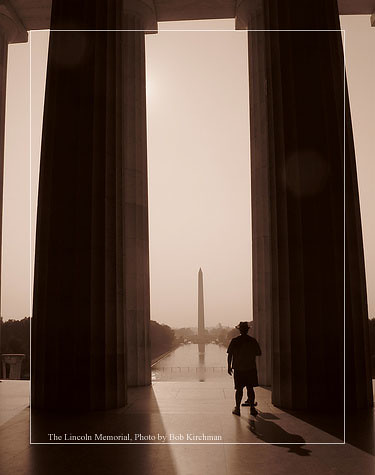
Photos by Bob Kirchman.
Inspiration: The Lincoln Memorial
Frank Capra's film: Mr. Smith Goes to Washington [click to view] includes some very powerful and moving scenes shot at the Lincoln Memorial. Here are presented some of my own photos taken one morning at the memorial which are reminiscent of and inspired by Capra's keen eye.
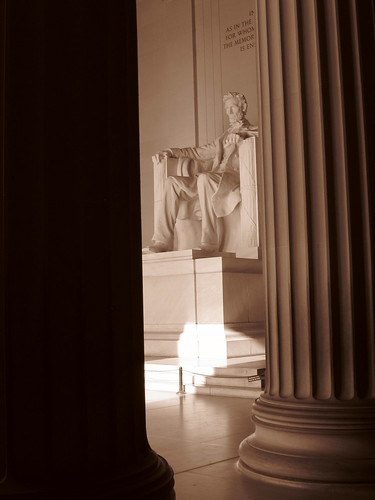
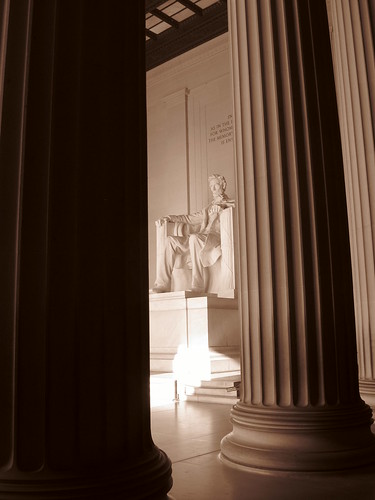

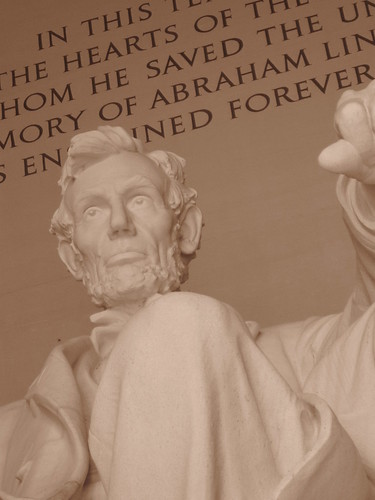
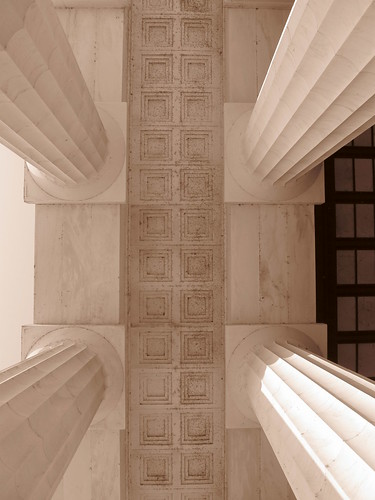
Lincoln's Gettysburg Address
(19 NOVEMBER 1863)
Fourscore and seven years ago our fathers brought forth on this continent, a new nation, conceived in Liberty, and dedicated to the proposition that all men are created equal.
Now we are engaged in a great civil war, testing whether that nation, or any nation so conceived and so dedicated, can long endure. We are met on a great battle-field of that war. We have come to dedicate a portion of that field, as a final resting place for those who here gave their lives that that nation might live. It is altogether fitting and proper that we should do this.
But, in a larger sense, we can not dedicate-we can not consecrate-we can not hallow-this ground. The brave men, living and dead, who struggled here, have consecrated it, far above our poor power to add or detract. The world will little note, nor long remember what we say here, but it can never forget what they did here. It is for us the living, rather, to be dedicated here to the unfinished work which they who fought here have thus far so nobly advanced. It is rather for us to be here dedicated to the great task remaining before us-that from these honored dead we take increased devotion to that cause for which they gave the last full measure of devotion-that we here highly resolve that these dead shall not have died in vain-that this nation, under G-d, shall have a new birth of freedom-and that government of the people, by the people, for the people shall not perish from the earth.
The Words of Wycliff
By James Renwick Manship
Honest Abe in his Gettysburg Address "stole" the words of the Rev. John Wycliffe, known as the Morning Star of the Reformation, from the General Prologue to the first translation of the Holy Bible into the English language, in the Year of Our Lord Jesus 1385.
The wise words of Wycliffe were "The BIBLE is for the government of the people, by the people and for the people." Honest Abe Lincoln left out the MOST important word of Wycliffe's wise words, that is the BIBLE.
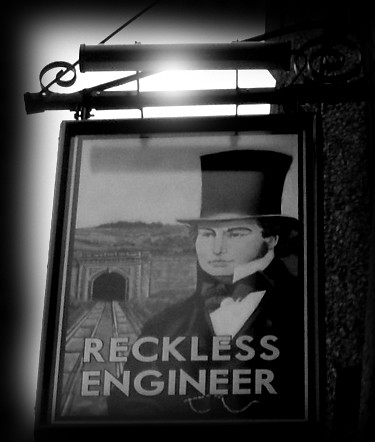
The Reckless Engineer
Short Story by Bob Kirchman (continued)
All of the Reckless Engineer has gone And where now does heart and soul beat in the city sky?”
-- Coast, ‘The Reckless Engineer’
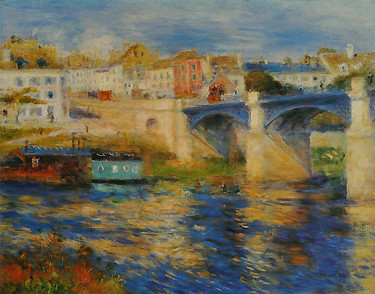
Le Pont de Chatou, Pierre Auguste Renoir
A bridge is a complex machine… or perhaps more like a living organism in that it moves and needs to be constantly renewed,” Rupert said as the little group entered the service stairway down into one of the great span’s floating piers. “In the Twentieth Century, great public works were authorized, heavily funded by the U. S. Federal government. In fact, they had a 90% match to 10% state funds. They did think of maintenance, it was supposed to have been funded by fuel taxes… but with the initial outlay for the bridges being so relatively cheap, it became all too easy for politicians to divert the funds that were supposed to be allocated for ongoing maintenance.
Fifty years after the great interstate highways were begun, an appalling percentage of the bridges on it were in questionable condition. Some of them actually failed outright.”
Alana and John soaked in the vast history of modern bridge building. Surely it was comforting to know that the operators of this bridge had learned some lessons from the past. Their tour had begun on the next morning… Saturday, but since they were on the International Date Line, the designation on operations calendars was Saturday/Sunday. Zimmerman had met them at the operations tower, beginning with the scores of monitor screens that allowed operations technicians to watch over the workings of Zimmerman’s ‘Darling Bridge,’ as he called it. That was a reference to Brunel’s affection for the Clifton Gorge span more than an infatuation of Rupert’s however.
Where is Hannah?” Alana asked? “Oh,” said Rupert, “She’s off today, but I suspect we’ll see her when we stop for lunch at the Big Diomede site.” I think she was going to paint landscapes with Mrs. Greene after church there today if the weather was nice.”
Sure enough, after a morning of ascending and descending into towers, piers and passageways, the entourage emerged on the large island in the middle of the strait to a balmy afternoon. The brief tundra flower explosion was brightly covering the wild plateau of Big Diomede and there overlooking the colorful display and the sea beyond, two women stood at easels painting en plein air. They looked like a Renoir painting themselves standing upon the verdant island. The wildness of this place dwarfed even the massive biosphere dome under construction. There was a raw beauty to this place and the timeless figures who painted it only added to its mystique. Under the freshly constructed dome a small lone house rose. Workmen were putting the finishing touches on it.
Rather than eat at the service plaza, I thought we’d prepare a nice picnic supper,” Mrs. Greene said after introductions. They were soon joined by Reverend Greene and Elizabeth Zimmerman O’Malley, Rupert’s daughter. It seemed like a fine Southern ‘dinner on the grounds,’ which indeed it was the remnants of, as it was Sunday on Big Diomede and the little church that met in the service plaza meeting room had indeed enjoyed such a feast earlier in the day. It was like a warm breeze from another Century… indeed even the driven Zimmerman seemed to slow down for it. John was impressed: “I did not expect food like I grew up on in… SIBERIA!” he exclaimed as he enjoyed a portion of macaroni and cheese that gained him a scornful glance from Alana, the health nut. But even she was obviously reveling in a bit of home so far from home.
Tomorrow I will give you the full tour.” Said Elizabeth, but today we will continue on with the inner workings of the great bridge. “Tonight,” Hannah said, “I would love for you to be my dinner guests at my condo in Wales. Would you?”
The day ended with the sun low in the sky and the last descent into a bridge pier where Rupert opened a hatch. His granddaughter smiled: “You’re showing them the fishing spot!” she happily exclaimed. Indeed they found rods and a small catwalk outside the hatch where they cast for some nice ocean fish. “We’ll cook them up at Hannah’s place,” Rupert said. “But I’m afraid I won’t be able to join you as this blasted cell phone is now giving me the message that we have an issue with the bridge seals in sector 217. I’m afraid I’ll have to set up a work zone tonight.
Indeed the dinner group shrunk to John, Alana, Elizabeth and Hannah. As they gathered in her condominium, Elizabeth took a call. The work on the seals was going badly. She excused herself. “My father will kill himself for his ‘darling bridge’ if I don’t go out to take some of the load off. Thankfully some of his senior guys have his back and call me like this.”
Tell me about the biosphere,” said Alana. “I just KNOW there is a story behind it.” Hannah looked about, walked over to her door and locked it. Slowly and deliberately she began: “When Mr. Z started this project, he was a pretty brash, no nonsense sort of ruthless industrialist. He ‘reaped where others sowed’ if you know what I mean. There is something you guys need to know about him. You’re in the program by the way, just don’t breath a word to HIM. I know though… I saw the look of satisfaction on his face when we met the relamping crew on the bridge. Alana, when you did not hesitate to climb up with the bulb… the man was one short, remember… you sealed your fate. I daresay the offer will be coming tomorrow.”
Hannah continued:
Zimmerman is a tough old bird, he fought in the battle of Anchorage and all, but when he began this great work people began to see another side of him. There was a young engineer and surveyor that he took under his wing. They went out to Siberia to lay out the road and discovered that it was like the Wild West out there. Trucks that broke down or wrecked by the side of the road were left there. After the local bandits looted them they set them on fire. Rusted and burning hulks were everywhere.
By the time you could get a recovery truck out there, the deed had already been done. The bandits would pull a driver out of his truck if it stopped out there and kill him.
Well, Mr. Z and this other young man were camped out there with plenty of guards… or so they thought, when they were ambushed and kidnapped. The bandits managed to pick off their security people. They took Mr. Z and his friend captive, knowing there would be big ransom money. When they missed Elizabeth’s frantic response and thought the money was being stalled, they took the young man away. That was the last time Mr. Z saw him alive.
The ransom money finally came and Mr. Z. was returned. When he returned to Wales he immediately organized a group of Alaska National Guard and they travelled back disguised as a road crew. When they got back to the site of the ambush, they discovered that the body of the younger man had been found in a cheap motel room in a trailer motel that was… well… not a nice place. The body was stripped and smelled of vodka. Rupert er I mean Mr. Z knew the man never drank. He was enraged that the perpetrators would sink to creating a sordid story. Zimmerman knew the man’s wife and children.
That was the only time I ever saw Rupert cry, and he wept unashamedly. I knew then that a man I had thought so cold and aloof loved deeply. He could be moved to tears by the loss of a cherished colleague.
He composed himself pretty quickly, however. His men could not get the local authorities to help them find the killers so in the end, in his great anger, he ordered everyone out of the motel buildings at gunpoint and soaked the place with petrol. Then he burned it to the ground. He returned to Wales visibly shaken but back to his old aloof self. He set up a trust for his friend’s widow and children and spoke at the memorial service of his fine service. But he was holding something inside that he couldn’t let go.
The flashbacks returned from his war days. Everyone thinks the reason he’s estranged from his wife Pat is that she doesn’t like cold places. The truth is he wakes up screaming… and he won’t seek help for it. He visits her regularly in Virginia but the truth is HE doesn’t want her here when he falls apart. He won’t let go of his anger and sorrow. I fear it is going to kill him one day!
The biosphere you saw today… its more than an environmental experiment… It is largely the creation of Elizabeth, but you must know that it is Rupert’s true ‘darling’ in that he sees it as an antidote to the “Hell on Wheels” he found across the strait. He claims to have no faith… that pretty much went away in his childhood he says. He ‘survived’ indoctrination by the ‘Sisters of Mercy.’ He says they showed none.
But he knew that his biosphere would be nothing more than glass and steel if it did not have some sort of a soul. That is why he convinced the Greenes to come up here. If you didn’t notice before, see how he lets down his guard in their hospitality. Tomorrow you must see the renderings Elizabeth and Mrs. Greene have prepared for the biosphere. These are not the works of one who merely desires austere efficiency.
I really don’t know why I am telling you all this, but I sense that you may indeed be in a position to help him. He allows Elizabeth and his granddaughter to come closer, but I feel like he’s a clock wound too tight… and working in two concurrent times, I fear he’s going to break!”
(to be continued)
© 2017 The Kirchman Studio, All rights reserved.
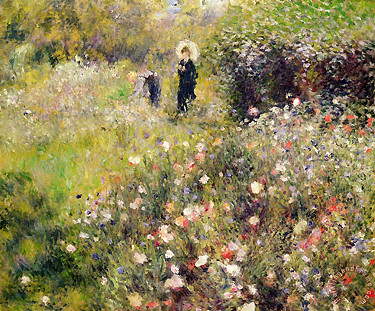
Summer Landscape, Pierre Auguste Renoir
